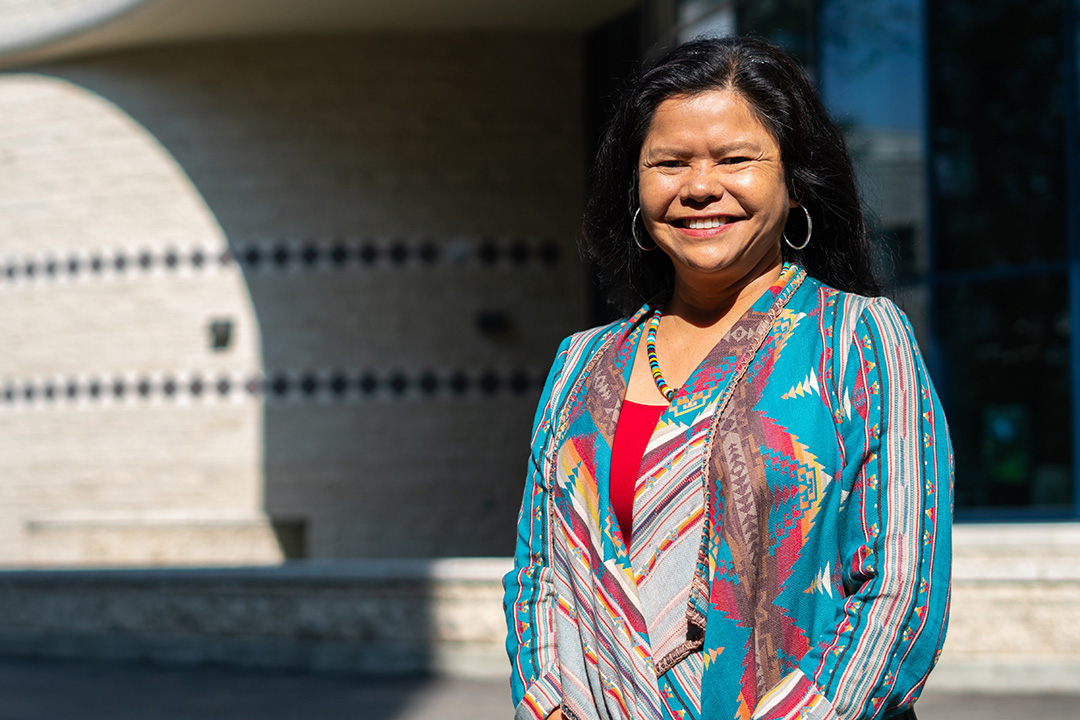
Jacqueline Ottmann: Embrace manacihitowin
When Dr. Jacqueline Ottmann (PhD) first learned of the University of Saskatchewan’s (USask) new plan to shape the institution through to the year 2025, she couldn’t wait to get started.
By James ShewagaOttmann was hired on Oct. 1, 2017 to serve as the university’s first vice-provost of Indigenous Engagement, supporting the key pillar of Indigenization that has been woven throughout the entire new strategic plan unveiled in 2018 to be The University The World Needs. It was that level of commitment in the new university plan—gifted by Elders the Indigenous names nīkānītān manācihitowinihk (Cree) and ni manachīhitoonaan (Michif) for “Let us lead with respect”—that helps drive Ottmann’s passion to support students and move the university forward.
“I was really excited about the university plan from the very outset,” said Ottmann. “What I was witnessing and being engaged with was actually something that I had been looking forward to at some point in my career. I looked at Indigenous strategies and university plans for the last 13 years and I think the difference here is the university plan does incorporate concepts of Indigenization and reconciliation, decolonization, and Indigenous languages. The University Plan 2025 is a foundational document, which is again really exciting. It’s not a separate Indigenous strategy. These concepts are embedded right into the backbone of our document.”
The new university plan has built on the foundation of USask’s commitment to Indigenization and reconciliation. USask hosted the first national forum in 2015 in response to the Truth and Reconciliation Commission of Canada’s final report. That forum—Building Reconciliation: Universities Answering the TRC’s Calls to Action—was the first of what has become an annual gathering for Canadian university leadership teams working together with First Nations and Métis leaders, Indigenous scholars and student leaders.
“The Truth and Reconciliation Commission’s 94 Calls to Action have sparked change for universities across the nation and some are related to education,” said Ottmann. “One goal within the university plan is embracing manacihitowin or manachīhitoonaan. This goal invites us to developing respectful, reciprocal relationships, so we’re all renewed and restored.”
Ottmann said the university has an opportunity and an obligation to learn and respectfully share Indigenous stories and histories to develop deeper understandings of concepts like manacihitowin.
“Indigenous stories, teachings and songs will inspire and strengthen our campus community and people beyond our boundaries,” she said. “It’s important to meet Indigenous peoples where they are at, and to be open to being led by Indigenous peoples when it comes to Indigenization and manacihitowin.”
“The wisdom of Indigenous knowledges really does flow right from the Mission, Vision, Values principles, all the way through the aspirations,” she added. “Indigenization has to be felt within the entire fabric of the university, from procurement to teaching, learning and research, experienced by our students, staff and faculty. Each day, we all need to consider how decolonization, reconciliation and Indigenization will unfold in our spaces, interactions and work.”
The University the World Needs
People of the plan
The University of Saskatchewan’s new seven-year plan through to 2025 is titled The University the World Needs and has been gifted the Indigenous names nīkānītān manācihitowinihk (Cree) and ni manachīhitoonaan (Michif), which translate to “Let us lead with respect.” In each issue of On Campus News in 2019, we will take a look at the 12 major goals of the new plan by profiling individuals involved in the university’s commitment to Courageous Curiosity, Boundless Collaboration and Inspired Communities.

